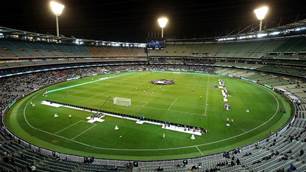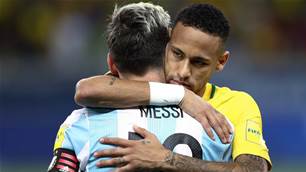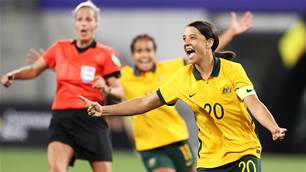IT SAYS much about the relative expectations of England and Brazil that Fabio Capello remains in his job after bowing out in the last 16, while Dunga did not survive 48 hours following the quarter-final defeat to Holland.
There is also proof that small details make all the difference at the highest level these days given that if Maarten Stekelenburg had not clawed Kaka's goalbound shot away in Port Elizabeth when Brazil were already a goal ahead, Dunga may have added the World Cup to the Confederations Cup they won on South African soil 12 months earlier.
As it was, a very rare mistake from keeper Julio Cesar and the dismissal of Felipe Melo changed the course of history and Dunga's pragmatic approach was gone.
After all, if being solid is not going to bring glory, Brazil might as well go back to being Brazil.
Not that South Africa 2010 was completely without its high spots for the Samba stars.
Maicon's swerving effort from the touchline in the opening game against North Korea was a tournament highlight and the 3-1 victory over the Ivory Coast was as one-sided as the scoreline suggests.
But the stardust was largely missing from the most glamorous team, which partly explains why the tournament as a whole failed to take off.
"We are all responsible, but as coach, I have the greatest responsibility," Dunga said.
"All the decisions I took were with the Brazil national team in mind.
"I am very proud to coach these players given the dignified manner in which they have always played for the Brazilian national team."
Had that shot against the Dutch gone in, Kaka might have gone on to stamp his authority on the tournament.
As it was he joined the long list of feted stars of whom so much was expected but in the end delivered precious little.
Funnily enough, Brazil's impetus seemed to disappear when Elano was injured towards the end of that Ivory Coast game by a tackle from Cheik Ismael Tiote that really should have resulted in a red card.
Booted out of Manchester City by Mark Hughes for a perceived poor attitude, Elano was absolved of defensive responsibilities by Dunga and quickly showed why Sven-Goran Eriksson brought him to Eastlands in the first place.
With him, Brazil boasted additional creativity. Without him, Kaka had to do the work on his own. And he wasn't up to the task.
A knockout round victory over Chile was the type of win Brazil tend to record against opponents who still get a little bit overawed by those famous yellow shirts.
It was the same for Holland in the 1994 quarter-finals. Sixteen years on, the magic is no longer there.
Still, that Julio Cesar, normally such a fine keeper, should make the blunder that cost his team so dearly, is still a surprise even now.
There was certainly no doubt as to whom the Brazil public pinned the blame on when the team returned to South America, given the Inter Milan star was still greeted warmly, having broken down in tears as he gave his version of events immediately after the defeat.
"The trust of the Brazilian fans was high," he said.
"The feeling is sadness. The locker room collapsed. When Brazil gets to a World Cup they are always favourites."
So now Brazil go back to basics, with the public's demand no doubt for more flamboyant tactics more suited to their image.
The big question is, has the game changed so much that Brazil can no longer win like that?
In four years' time, the world will reassemble in South America.
Whoever is at the helm by then will be expected to win. With style. No pressure there then.
As it was, a very rare mistake from keeper Julio Cesar and the dismissal of Felipe Melo changed the course of history and Dunga's pragmatic approach was gone.
After all, if being solid is not going to bring glory, Brazil might as well go back to being Brazil.
Not that South Africa 2010 was completely without its high spots for the Samba stars.
Maicon's swerving effort from the touchline in the opening game against North Korea was a tournament highlight and the 3-1 victory over the Ivory Coast was as one-sided as the scoreline suggests.
But the stardust was largely missing from the most glamorous team, which partly explains why the tournament as a whole failed to take off.
"We are all responsible, but as coach, I have the greatest responsibility," Dunga said.
"All the decisions I took were with the Brazil national team in mind.
"I am very proud to coach these players given the dignified manner in which they have always played for the Brazilian national team."
Had that shot against the Dutch gone in, Kaka might have gone on to stamp his authority on the tournament.
As it was he joined the long list of feted stars of whom so much was expected but in the end delivered precious little.
Funnily enough, Brazil's impetus seemed to disappear when Elano was injured towards the end of that Ivory Coast game by a tackle from Cheik Ismael Tiote that really should have resulted in a red card.
Booted out of Manchester City by Mark Hughes for a perceived poor attitude, Elano was absolved of defensive responsibilities by Dunga and quickly showed why Sven-Goran Eriksson brought him to Eastlands in the first place.
With him, Brazil boasted additional creativity. Without him, Kaka had to do the work on his own. And he wasn't up to the task.
A knockout round victory over Chile was the type of win Brazil tend to record against opponents who still get a little bit overawed by those famous yellow shirts.
It was the same for Holland in the 1994 quarter-finals. Sixteen years on, the magic is no longer there.
Still, that Julio Cesar, normally such a fine keeper, should make the blunder that cost his team so dearly, is still a surprise even now.
There was certainly no doubt as to whom the Brazil public pinned the blame on when the team returned to South America, given the Inter Milan star was still greeted warmly, having broken down in tears as he gave his version of events immediately after the defeat.
"The trust of the Brazilian fans was high," he said.
"The feeling is sadness. The locker room collapsed. When Brazil gets to a World Cup they are always favourites."
So now Brazil go back to basics, with the public's demand no doubt for more flamboyant tactics more suited to their image.
The big question is, has the game changed so much that Brazil can no longer win like that?
In four years' time, the world will reassemble in South America.
Whoever is at the helm by then will be expected to win. With style. No pressure there then.
Copyright (c) Press Association
Related Articles

'It's fair to be pretty pissed off' - MCG fans down as Argentina-Brazil tie off

Brazil and Argentina must replay World Cup qualifier













